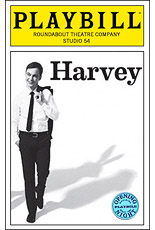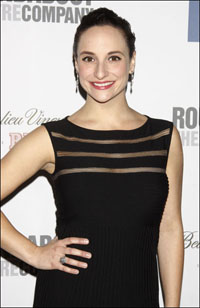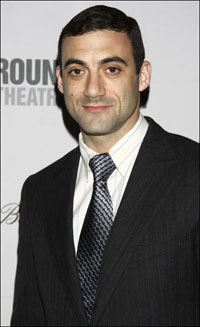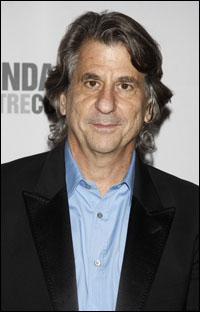
*
Dysfunction, dementia, delirium tremors — these were not dirty words back in the day when Mary Chase wrote her famous fun-fest, Harvey. Seen today in this much less gentle age, via the revival that arrived June 14 at Studio 54, they are not the stuff of which comedies can be crocheted, no matter how light-fingered.
Nevertheless, it is possible to go with that long-gone innocence that allowed us to find merriment in a thoroughly certifiable, but blissful and benign, barfly named Elwood P. Dowd, who pals around with a great pooka, an invisible six-foot rabbit that can be seen only by him (and, in certain moments of stress, by his sister, Veta).
Obviously, this rabbit tale has some following: the original Broadway production which starred a fey Frank Fay ran 1,775 performances and won the Pulitzer Prize (over— Ouch! — The Glass Menagerie). The 1950 film version and 1970 Broadway revival, both starring James Stewart, met with success as well.
One would like to think that, no matter how dark the times, one can always have an open heart for an imaginary friend who's more than a little outsized and furry. Presumably, that was the spirit in which the Mary Chase comedy found its way onto the desk of director Scott Ellis. "I read it and loved it and said, 'Let's go to Roundabout and see if we can find an Elwood.' You can't do it without an Elwood."
Elwood P. Dowd, who may or may not be born of woman, requires idiosyncratic casting in the extreme — and bang! "The Big Bang Theory" provided one with Jim Parsons. In addition, he proved theatre-friendly by spending the summer in a supporting (and Theatre World Award-winning) role in The Normal Heart.
"Jim was on the list that Roundabout initially drew up," recalled Ellis, "and I thought, 'That looks interesting' so we went out to L.A. and did a reading of it with him."
The role and the actor made an immediate click, and the clicking continues. "Really, from Day One of starting rehearsal, it has been sheer joy, just doing something different, literally playing a character who is so warm and so embracing of other people as opposed to my Day Job. I love Sheldon Cooper, but he's not warm and embracing.
"It's such a joy to perform this play every night for the audience even though it's live theatre. Things go wrong. You mess up a line. You drop a prop — whatever happens, you always want it to be perfect and it's never perfect. It doesn't matter. By the end of the evening, I feel so overjoyed to have been a part of telling this story, and the audiences' reactions have been so happy and so pleased. It's a credit to Mary Chase. It's just such a solid story. If you just tell it as honestly as you can, people get it, and they love to hear it."

Buy this Limited Collector's Edition |
Somehow, Hull didn't intimidate the game, brave and resourceful Hecht. "There is no way I could be anything like her," the actress wisely reasoned. "There's nothing that I could do that would ever capitalize on who she is. You know, she's just so radically different that I thought I had to go a whole other direction." So she did just that.
She opted for a psychological explanation for Veta's hilarious, high-collared hysteria: "I had an instinct about this time period — and maybe it's unfounded — but I had a feeling because essentially the period we're talking about [1944] is when women were freed from this emotional bondage they were in. They were all pent-up, then Freud had this idea of psychoanalysis and these hysterical women kinda finding themselves. And that's really, I think, just what happened with Veta. I started to realize there was plenty of room for me to experience that.
"Freud died in '39, and it was late '30s-early '40s that all this activity was happening in terms of therapy, and she really strikes me as someone who would deeply benefit from that experience, so I just really went for it."
 |
||
| Tracee Chimo |
||
| Photo by Joseph Marzullo/WENN |
But she does appreciate the innocence and sweetness that cling to the play. "That's my favorite part," she admitted. "I think, actually, one of the most beautiful things about this play is the innocence and remembering the childish enthusiasm that we all should hang on to. It's the most beautiful part of our adult life. We forget the inner child, and this play reminds us it's kind of a wonderful thing to hang on to."
As the tightly wound but easily unraveled figurehead of the sanitarium Chumley's Rest, Charles Kimbrough starts out with a firm grasp of reality, but it gets away from him, and he's a shambles by the final stretch. "Basically, he's a humorless creature — till the end, then it's all gravy." It's a strenuous comic workout, his first since winning the 2010 St. Clair Bayfield Award as the colossally scattered Prince of Arragon.
"I'm starting to have fun with this. It was more challenging than it looked. I haven't done a play since The Merchant of Venice — I've been quiet, I've been semi-retired — but this came along and won me over, and I said, 'Yeah, I want to do that.' When we started rehearsals, there were certain physical challenges in the part that I hadn't realized in the beginning. This wild cross from the door to the office has to be absolutely unrestrained. You gotta just go crazy. It took me a while because I did something to my knee. You're always shocked to find you're the age you are. When you try to do something like that, your body talks to you very sharply. It says: 'What the hell are you doing?' So it has taken a little while to get my stamina back."
Carol Kane does her squeak-and-dither number as Chumley's wife. "I just love her simplicity, her willingness to have fun," she said. "This play is written so beautifully. The set design, the costume design, the lighting — it's just a gift to be part of." Plus, she didn't have to do any special bonding with Kimbrough so they'd seem married: "A long time ago, down at The Public Theater, we did a workshop of a John Guare play together called Marco Polo Sings a Solo."
 |
||
| Morgan Spector |
||
| photo by Joseph Marzullo/WENN |
The most grounded character on stage may well be the funniest — Duane Wilson, the sanitarium orderly struggling to keep his very thick head above the craziness churning around him despite the changes of signals every ten minutes. Gruff, no-nonsense, dead-on, Rich Sommer makes a perfect landing on Broadway.
"I can't believe it," he said of his new career niche as a Broadway actor. "It's a very, very exciting thing to be a part of. I've thought about Broadway since I heard about Broadway so to be a part of it now, a part of the lineage — it's sorta mind-boggling."
He's not the first person to make his Broadway bow as this lovable lug. Jesse White gave a breakout performance of him in the original production, went on a prolific acting career and finally ended his days in commercials as The Maytag Repairman.
A delightfully ditzy bit is delivered by Angela Paton, showing cloudy concern that she can't quite make out this six-foot-three-and-a-half-inch rabbit Elwood's introduction to her. There's a quiet desperation around her eyes and smile. She has had a brush with these eccentrics before. "Sixty years ago," she said, "I did Mrytle Mae in summer stock at the Chase Barn Playhouse. The seats were old opera seats provided by a New York Times opera reviewer named Chase — no relation to Mary Chase. That was the production I met my husband, Robert Goldsby. He has just written a book called 'Moliere on Stage: What's So Funny?'"
 |
||
| David Rockwell |
||
| Photo by Joseph Marzullo/WENN |
Debra Monk rates special thanks in a special box on the cast page. It seems that she recorded the voice that's "entertaining" the ladies club in the living room next to the library. In person, just back from the Chicago production of The Iceman Cometh, she was singing the praises of Nathan Lane's Hickey.
Parsons partisans included The Normal Heart contingent (Joe Mantello and Tony winners Ellen Barkin and John Benjamin Hickey) and the Texas contingent (Hickey, Julie White and Woody Harrelson). "The last season of 'The Big C' wraps on Sunday," Hickey noted. "After that, I'm an ocean of unemployment, so if you hear of anything . . ."
Harrison just put into rehearsal June 11 a play he co-wrote with Frankie Hyman and is directing, Bullet for Adolf, which starts previewing July 19 at New World Stages. "The interesting thing is that it's all actual people we met doing construction work in Houston during the summer of '83. After that summer, I wanted to make a play about them they were such good characters. We didn't have much of a plot. We had to fictionalize that a bit. We got it together and did it in Toronto a little over a year ago in the spring. For the New York production, we're bringing two people from the Toronto version — the two comedic geniuses: David Coomber and Brandon Coffey — and the rest is cast here."
Also in attendance: Bobby Cannavale, "The Good Wife" herself Julianna Margulies, "Mad Man" John Slattery, NBC Newsman David Gregory (son of Harvey rights-holder Don Gregory), Neil Simon and his Sugar, Elaine Joyce, comedienne-producer Jamie de Roy and her sugar, Tony Roberts, The Unsinkable Molly Brown revisionist Dick Scanlan, Café Carlyle-bound chanteuse and reformed bank-robber Laura Osnes, chronically employed Tovah Feldshuh (whose next role is real: Mother of the Groom at the Harvard Club on Aug. 5), John Kellogg Hodgman from "The Daily Show," Charles Randolph-Wright with Valisia Lekae, "30 Rock"/"Rock of Ages" brick Alec Baldwin and Hilaria Thomas, and Nolan Gerard Funk and Katie Holliday.
The opening-night party was held at the Liberty Theatre at Famous Dave's on West 42nd, awash in and obscured by the neons outside. There were two specialty cocktails: Rokk Vodka with orange juice ("Charlie's Concoction," presumably a specialty of the house at one of Elwood's local dives) and Rokk Apple Vodka With Cranberry Juice ("Formula 977," a needleful of which will eliminate tall white rabbits from Elwood's vision and give him pink elephants like the rest of us).
View highlights from the show:




































































